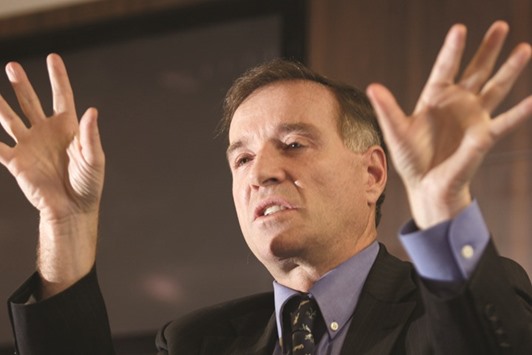Eike Batista, once Brazil’s wealthiest man, isn’t negotiating conditions for his return to Brazil days after federal police declared him a fugitive, his lawyer said.
Batista “never made turning himself in subject to any type of condition from the judiciary, which would be legally unacceptable and doesn’t conform to his ethical convictions nor correspond with his conduct,” the lawyer, Fernando Martins, said in an e-mail. “From the moment his preventive prison was decreed, he has made all efforts to return, as soon as possible.”
Federal prosecutors accuse Batista of money laundering and corruption, including the payment of $16.5mn in bribes to former Rio de Janeiro Governor Sergio Cabral, jailed in November. Batista and Cabral are targets in the long-running Carwash investigation that revealed a kickback scheme involving Brazil’s biggest builders and the state-run oil producer Petrobras. The probe has since advanced to threaten sitting legislators, and a prospective plea bargain from Batista could further rankle the political establishment.
In a pre-dawn raid of Batista’s hillside mansion on Thursday, police found a Lamborghini Aventador luxury sports car parked in his living room and about 100,000 reais ($30,000) in cash inside a safe, but not their suspect. Batista had flown to New York less than 36 hours before the raid, police later learned. His name was included on Interpol’s list of wanted persons, and Brazilian authorities called him a fugitive.
Martins said in his statement that Batista is abroad on business, without specifying where. It remains unknown whether Batista remained in New York, and authorities are not negotiating his return, but rather are adopting all protocols for his capture, according to the federal police’s press office.
Batista’s commodities and logistics empire raised his personal fortune to more than $30bn at the start of the decade, transforming him into Brazil’s richest man and one of the wealthiest people in the world. Those riches evaporated after his group of startups went bust under a mountain of debt and insider trading investigations. At one point in 2015 he gained the rare distinction of “negative billionaire” when his net worth sank to more than $1bn in debt.
Batista remained a colorful personality, and vowed to stage a comeback. He has promoted ventures including a generic version of Viagra, cattle cloning and biomass exports. More recently he touted a line of toothpaste, named Elysium, that uses hydroxyapatite instead of fluoride to regenerate tooth enamel. Batista wrote in the introduction to his 2011 autobiography that, while he speaks five languages, he didn’t complete his metallurgical engineering studies at university. In that case, he wouldn’t be imprisoned in the unit reserved for people with college degrees, such as former governor Cabral, according to the press office of Rio’s prison administration secretariat.
The prospect of being shipped to a common jail cell could provide Batista additional incentive to strike a plea bargain, said Joao Augusto de Castro Neves, Latin America director at the political consulting firm Eurasia Group. Ilona Szabo, executive director of Rio-based security think tank Igarape Institute, said Batista could have his own cell within the common block to reduce the risk of harm to a man who may provide valuable information to investigators.
“Eike will want to avoid prison and will be willing to offer something,” Castro Neves said by phone. “The ball will be in prosecutors’ court to see whether they accept it. As Carwash continues, there’s an argument to be made that if you’re late to the game you have less to offer.”
Without saying how it obtained the information, local paper O Globo reported Batista’s lawyer gave federal police a written guarantee that Batista would return today, and that no agreement was made for him to be jailed in a special cell block. The police’s press office declined to confirm the report, and Batista’s lawyer didn’t immediately reply to an e-mail on Saturday evening.
Brazil’s overcrowded prison system has become a flash-point as of late, with several violent rebellions erupting across the country. In Rio’s Bangu facility, the population is more than quadruple the prison’s capacity, according to information from Rio state’s office of public defenders.

Batista: ‘Abroad on business’.
